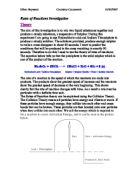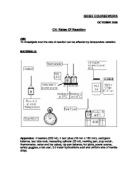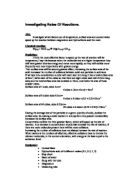28th February 02
Year 10 Science Coursework
Rates of Reactions
Introduction
This year in chemistry we have been studying different types of reactions and what affects their rate. To help with this work, we have been given an experiment to investigate and analyse the factors influencing the rate.
What is the rate of a reaction?
The rate of a reaction is a measurement of its speed. It is calculated by measuring how quickly reactants are used up or products are formed. (Usborne Illustrated Dictionary of Science)
Planning
Our task is to investigate ONE of the factors affecting a particular reaction. The reaction we are going to investigate is:-
Magnesium + Hydrochloric acid --> Magnesium Chloride + Hydrogen
Mg + 2HCl --> MgCl2 + H2
I have chosen to investigate this reaction because it will be easy to measure the rate. Hydrogen gas is given off and so I will be able to collect and measure it.
Many factors can affect the rate of a reaction.
* Temperature
* Surface area of magnesium
* Use of a catalyst
* Concentration of acid
The Collision Theory
For a reaction to take place between two substances, their particles must collide, so if more collisions occur, the rate of the reaction increases. However only some collisions are successful. This is because not all particles have enough energy to break bonds in other particles. We can alter the conditions under which the reaction takes place so that more collisions occur in a given period of time and so that the rate will increase.
Temperature
When the reactants are heated, the rate generally increases. When the reactants are cooled, the reaction generally goes slower. According to the collision theory, particles must collide in order to react. Heat gives the particles more energy to move around and so they increase their speed. This increases the chances of a collision , and more importantly a successful one, as they are hitting each other with greater force with increased energy. On the other hand, cooling has the opposite effects and the chances of successful collisions are reduced.
Surface area
When the surface area of the solid reactant is increased, i.e. the reactant is powdered, the rate of the reaction will also increase. This is because there are more particles exposed for the particles of the other reactant, e.g. acid to collide with. The more particles exposed, the more collisions and so a faster rate. If there are less particles exposed, e.g. the reactant is in lumps, there will be less collisions and the rate will decrease.
Use of a catalyst
A catalyst is a substance that increases the rate of a chemical reaction but is not used up itself. It works by lowering the activation energy needed to start the reaction. Activation energy is the minimum energy the particles need to have in order for collisions to be successful. The use of a catalyst lowers this minimum energy so the reaction will happen quicker.
Concentration of acid
If an acid is used in a reaction, its concentration can affect the rate. At a high concentration, there are more acid particles in a certain volume. This means there is a higher chance of a collision because there are more acid particles. As there are more collisions, the rate of the reaction will increase. At a low concentration, there are less acid particles in a certain volume. Therefore there is a lower chance of a collision because there are less acid particles. Because there are less collisions, the rate will decrease.
I could investigate any of these factors, but I am going to investigate the effect the concentration of the acid has on the rate.
I have chosen this variable because:-
* The temperature will be very hard to control as it never remains constant. This reaction is exothermic and so produces heat, so the temperature will change during the reaction.
* There are a wide range of concentrations available.
* If I was to choose surface area, I would have limited choices to investigate. (Lumps, strips or powder).
* I do not have ...
This is a preview of the whole essay
I could investigate any of these factors, but I am going to investigate the effect the concentration of the acid has on the rate.
I have chosen this variable because:-
* The temperature will be very hard to control as it never remains constant. This reaction is exothermic and so produces heat, so the temperature will change during the reaction.
* There are a wide range of concentrations available.
* If I was to choose surface area, I would have limited choices to investigate. (Lumps, strips or powder).
* I do not have the use of a catalyst as there isn't one for this particular reaction.
Measurements
Before I start my experiment, I need to work out how much Magnesium and how much Hydrochloric acid I will need. I need enough metal and acid so that they will produce 100cm3 of Hydrogen gas. I also need an excess of Hydrochloric acid.
Mass of Magnesium Mg
Mg + 2HCl --> MgCl2 + H2
I mole Mg = I mole H2
24g Mg = 24dm3 H2
÷ 240 0.1g Mg = 0.1dm3 H2
So to produce 100cm3 of Hydrogen, I need 0.1g of Magnesium.
Volume of Hydrochloric acid HCl
Mg + 2HCl --> MgCl2 + H2
I mole Mg needs 2 moles HCl.
Number of moles = Mass
Molar mass
Moles Mg = 0.1 = 0.00417 moles Mg
24
Using 0.00417 moles Mg needs 2 x 0.0043 = 0.0084 moles HCl
I am going to calculate the amount of acid needed for the lowest concentration, 0.25M. This is because the highest amount of acid is needed for this reaction, as there are less acid particles in a lower concentration, so I will always have enough.
0.25M solution HCl = 0.25 moles in 1000cm3
1 cm3 = 0.25 = 0.00025
1000
0.00084 moles = a minimum of 33.6cm3 needed.
0.00025
To make sure I have enough, I will 40cm3 of acid each time, so that the acid is always in excess.
Range
The range of concentrations I am going to use is:-
0.25M 0.5M 0.75M 1M 1.5M 2M
I think this is suitable because I have a wide range of concentrations. Also, when I am analysing my results, I can see the effect doubling and halving the concentration will have on the rate.
Apparatus
* Conical flask
* Bung with tube
* Gas syringe
* Magnesium
* Hydrochloric acid ( 1M & 2M)
* Safety glasses
* Clamp and stand
* Measuring cylinder
* Ruler
* Balance
* Stopwatch
I have chosen this apparatus because I think it is the most accurate way of measuring the amount of gas given off.
Fair test
So that my investigation is a fair test, I need to keep all my variables constant except one. This is because all of these factors will affect the rate unless kept the same during the experiment.
Temperature
The temperature I have used is room temperature, because this will stay constant. The reaction is exothermic and so will heat up, but this change will be the same for all the experiments so it does not affect my results. I will locate my experiment near any open windows, heaters or any other sources of temperature change. I will do all of my experiment in one go so there isn't any time for temperature changes.
Surface area
So that the surface area remains the same, I will cut strips of magnesium from a roll of metal that is all the same length and width. I have already worked out that I need 0.1g of magnesium, so I will cut a strip, weigh it and cut it down until it weighs exactly 0.1g.
Use of a catalyst
I will not use a catalyst in any of my experiments.
The only variable I will change is the concentration of Hydrochloric acid.
Preliminary work
I need to do some preliminary work before I start my main experiment. This is so I can check that my measurements of magnesium and hydrochloric acid are correct, and that the range of concentrations I have chosen are suitable. I will check the lowest and highest concentrations to see whether they will produce enough hydrogen gas and whether their times are recordable.
The lowest concentration is 0.25M. To get this I will use 10cm3 of 1M acid and 30cm3 of water.
The highest concentration is 2M. To get this I will use 40cm3 of 2M acid.
Measuring out acid and water by hand is quite accurate but there is the possibility that I could measure it out wrong.
During my preliminary work, I tried the 0.25M experiment several times and found that the experiment stopped before enough gas was produced, and also the rate was too slow, so I decided not to do this concentration in my main experiment.
I also had a few problems with dropping in the magnesium, putting in the bung and starting the stopwatch all at the same time, so I had to get a friend to help. A lot of the time, I was not getting enough gas, this was probably because I was not putting the bung in quick enough so some gas was escaping.
At first I tried taking a reading every 10secs, but for the lower concentrations there was hardly any change and in the higher concentrations, it was going too fast to take that many readings, so I decided to take a reading every 20secs instead.
Preliminary work results
Concentration
Experiment 1
Experiment 2
Experiment 3
0.25M
Didn't finish
Didn't finish
Didn't finish
2M
0.9 secs
1.5 secs
0.5 secs
I didn't try 0.5M in my preliminary work, as the 0.25M reaction was never that far off finishing, so I knew that there wouldn't be any problems with the 0.5M.
So now the range of concentrations I am going to use are:-
0.5M 0.75M 1M 1.5M 2M
Prediction
* The higher the concentration of acid, the faster the reaction will go. It will be fastest at 2M and slowest at 0.5M. At higher concentrations there are more acid particles, therefore more chances of effective collisions and a faster reaction.
* The concentration of aid and the rate of reaction are in proportion to each other, (i.e. when the concentration is increased, the rate will also increase. When the concentration is decreased, the rate will also decrease.
* I also predict that when the concentration is doubled, the rate will also double, as there are twice as many acid particles and twice as many collisions. When the concentration is halved, the rate will also halve. The concentration and the rate are in direct proportion.
I predict that my graph will look something like this.
Method
I set up my apparatus as shown in the diagram. I then measured out 40cm3 of hydrochloric acid (mixed with water until it was the right concentration - see conversion table) which was poured into the conical flask. I then weighed out 0.1g of magnesium that was about 10cm long. I bent the magnesium into an S shape before dropping it into the flask so the acid would cover it all. The magnesium was then dropped into the conical flask, the bung put in before any gas could escape and the stopwatch started. I timed how long it took for 100cm3 of gas to collect in the syringe and I recorded the amount given off every 20secs. Each experiment was carried out 3 times. I did this so that I could take the average from the 3 results. This is in case of any anomalous results. I will use the averages for my table and graph.
Safety
I have considered safety for this experiment as I am working with acids. I will make sure I have a clear working area so my acid will not get knocked over. 2M acid is the most concentrated I can use, as above this it would be dangerous, as very concentrated acids are corrosive and very reactive. I must be careful not to allow the hydrochloric acid to be heated as this will give off hydrogen chloride fumes. I will wear safety goggles at all times to ensure I don't get acid in my eyes.
In this experiment, hydrogen gas is being produced. This gas is explosive so I will only be collecting small amounts of it.
Results
For my results, see table and graph. (Appendix A & B)
To plot my graph, I have used the set of results that were closest to the average for that concentration.
Analysis
I have drawn a graph with all the concentrations on so that I can compare them easily.
My results show that the higher the concentration, the faster the rate or reaction.
The 2M reaction took the shortest time to complete. This means that the rate for this reaction is the fastest. 2M acid is the most concentrated; (i.e. it has the most acid particles). As there are a greater number of acid particles, it is more likely for collisions to occur, lots of successful collisions mean a faster reaction.
The gradient on the graph for this reaction is noticeably steep. This shows that the reaction is very fast.
As the concentration is lowered, the gradient of the graph also decreases. This is because the rate of the reaction is getting slower. There are less acid particles and so less collisions.
The 0.5M reaction took the longest time to complete. This means that the rate is slowest for this reaction. 0.5M acid is the least concentrated; (i.e. it has the least acid particles). As there are fewer acid particles, it is less likely for collisions to occur. Fewer collisions mean a slower reaction.
For all the reactions, the line is steepest at the beginning, and then curves out towards the end. This shows that the reaction starts quickly and then slows down as both the reactants start to run out, as they are being used up in the reaction.
I have drawn a graph for concentration against rate. I have done this so that I can see if the rate and concentration are in direct proportion. If they are, the line will be straight and go through the origin.
On my graph for concentration against rate, the points do not lie on a straight line. They are scattered, but the line of best fit is straight and goes through the origin. To make this graph, I took the amount of hydrogen gas produced at each concentration at 20 seconds, and plotted it against the concentration. I can see that my experiments did not start as they should, as on my graph with all the concentrations on, some lines overlap at the beginning. However, as the line of best fit is a straight line, I can say that the rate and concentration are likely to be in direct proportion.
I predicted that the higher the concentration of acid, the faster the reaction would go. I also predicted that the rate and concentration would be in direct proportion to each other, when one was doubled, the other would also double.
The results I have collected support my prediction.
Conclusion
The rate of a reaction tells us how quickly a reaction happens. (Chemistry for you, Lawrie Ryan).
When the concentration of the acid was high, (i.e. 2M) there were a greater number of acid particles. This increased the chances of collisions and therefore sped up the rate of the reaction.
When the concentration of the acid was low, (i.e. 0.5M) there were fewer acid particles. This decreased the chance of a collision and so the reaction took much longer to complete.
In my prediction, I said the higher the concentration, the faster the reaction would go, at 2M it would be fastest and at 0.5M it would be the slowest.
I also said that the concentration and the rate would be in proportion to each other, (i.e. when one increased the other increased too). Also when one was doubled, the other would double as well.
The results that I have collected support my prediction. The higher the concentration, the faster the reaction will go.
Evaluation
My experiment is not 100% reliable, although it is quite accurate. There are things which could have altered my results so that they are not as accurate as they could have been. However these errors would only be small.
* On some occasions I was rushing in the lesson and I may have not measured everything correctly. For example, if I had made the acid too concentrated then the rate would have gone faster, as there would have been more acid particles to collide with the magnesium particles.
* At the start of each experiment, I had to drop the magnesium into the flask, put in the bung and start the stopwatch all at the same time. Even though I got a friend to start the stopwatch for me, sometimes I didn't put the bung in quick enough, and some gas may have escaped.
As all the points on my graph lie more or less on the curve, I can say that there are no anomalous results.
I think my results are reliable because I did each experiment 3 times. These repeats accounted for any anomalous results.
Further work
If I wanted to add proof to my results, or find other trends and patterns I could carry out some further work. This could include: -
* Try the same reaction again but with a different acid or metal to see if I get the same patterns.
* Investigate a different reaction to find other patterns in the rate.
To improve the experiment I have done, I could keep a constant temperature for my reaction by using a water bath. This would ensure that temperature is not a factor affecting the rate.







